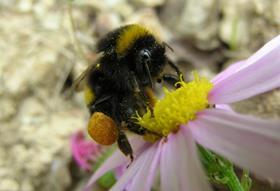
Bayer CropScience has welcomed the National Strategy to Promote the Health of Honey Bees and Other Pollinators, published by the US President’s Pollinator Task Force this week.
'Bees are important pollinators in modern and sustainable agriculture,' said Annette Schuermann, head of the Bayer Bee Care Center. 'The US strategy to improve pollinator health is a reasoned and multi-faceted approach. We fully support the call for extensive research into all aspects of pollinator health and the unprecedented commitment to increase suitable habitats and foraging, as a blueprint for a global approach to improving bee health.'
For almost 30 years, Bayer has been researching pollinator health, particularly managed honey bee colonies. Specifically, Bayer has focused on partnering with researchers around the world to better understand the various factors affecting honey bee health, helping beekeepers control the dangerous Varroa mite, expanding education and outreach on pollinator health, and promoting forage habitat for pollinators.
The Task Force, created last year by President Barack Obama, is co-chaired by the US Department of Agriculture (USDA) and the US Environmental Protection Agency (EPA) and outlines a comprehensive approach to tackling and reducing the impact of multiple factors on pollinator health.
Scientists and regulatory authorities agree that bee health is a complex issue. Major factors affecting honey bee health are, for example, pests and parasites, inadequate diet, bee management practices and severe weather events. Therefore, the Task Force has developed a four-pillar strategy which includes a Pollinator Research Action Plan, expanded education and outreach, public-private partnerships and improvements to pollinator habitats.
Bayer is committed to finding solutions to further improve honey bee health and safety by promoting sustainable crop management practices, including evaluating measures to enhance on-farm biodiversity through the creation of foraging and nesting opportunities.



